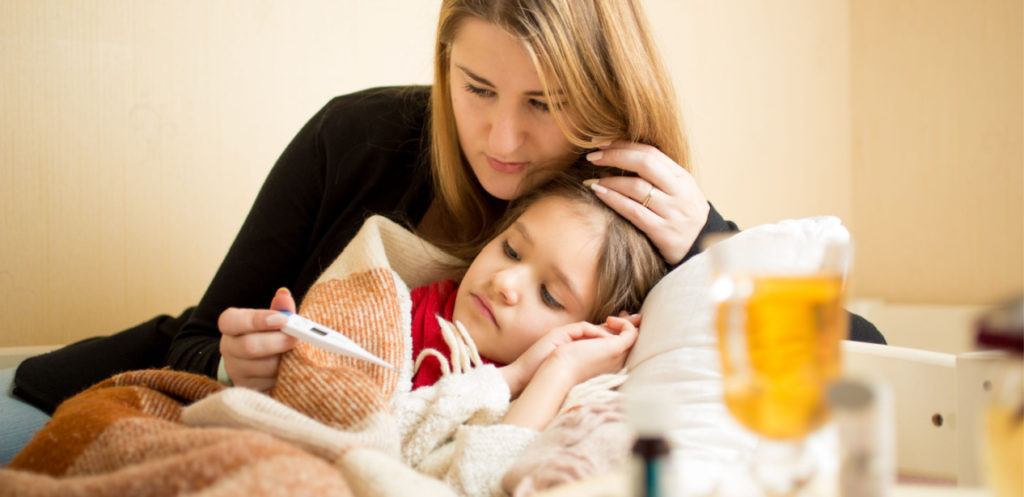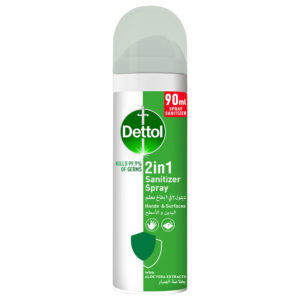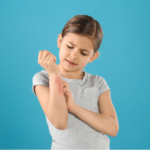We usually catch diseases because we made contact with someone who is ill. And the same applies to our little ones. According to the CDC, 14% of babies get the flu as a result of contact with someone who has it. As parents, we always fear that our kids will catch diseases or spread them. Therefore, it is very important to make sure they do not spread any infections while sick. Learn more here on how to keep your children from passing an infection when they are feeling unwell.
How to Protect Children from Passing an Infection?
1| Always wear a mask.
Wearing a face mask is one of the best ways to avoid germs and viruses spreading. When we are wearing a mask, it keeps the virus from getting to other people, thus protecting them. As parents, we must teach our children how to correctly wear a mask. Which includes covering both mouth and nose fully. It is also important to dispose of the face mask after using it properly and immediately. That is why we recommend disposable masks rather than fabric ones for sick children. Also, make sure your sick child does not take it off around public areas.
However, according to the World Health Organization, toddlers under the age of 5 should not wear masks. That is because they are unlikely to keep it on properly, and it might bother them as well. The best way to protect newborns and toddlers is for adults to keep their masks on around them. Especially if they are sick.
2| Encourage them to always wash their hands.
Hands are always the main source of spreading germs and viruses. That is why they must always be cleaned and sanitized. So, encourage your children to always wash their hands. This is not just during sickness, but it is an important personal hygiene habit that we all must adapt. We recommend antibacterial hand soap to kill all germs and keep our little ones’ hands virus free.
3| Teach kids how to sneeze or cough.
This is another important habit for good personal hygiene for both kids and adults. Demonstrate to your kids how to sneeze or cough properly. Which is by covering both mouth and nose with tissues. And sanitizing hands immediately after. Explain how they should not touch anything after because their hands will be filled with germs that need cleaning.
In case your children had no tissues on them, show them how to cover both nose and mouth with their arms and elbows. And make sure they sanitize this area immediately after.
4| Sanitize germ hotspots at home.
Germ hotspots are all around us at home. Those hidden germ hotspots might be neglected or forgotten about. Here are some of most famous germ hotspots at home:
- Remote controls.
- Phones and video games controllers.
- Door handles.
- Toys.
- Surfaces like desks, coffee tables, dining tables, and countertops.
- Sinks in both bathrooms and kitchens.
- Faucet handles.
While there are plenty of hotspots for germs to collect, cleaning them is actually a piece of cake. If you want something quick and easy. Use disinfectant antibacterial wipes. This is actually a chore that you can assign your kids with. As for deep cleaning, we recommend a sponge and Dettol’s disinfectant spray. Also, use hot water to wash those hotspots which is very sanitizing and will kill all germs and viruses.
5| Teach your kids about outdoor germ hotspots.
Furthermore, hotspots are everywhere outside our homes. There are plenty of germ hotspots in schools, such as:
- – School buses and seats.
- – Classrooms and desks.
- – Playgrounds.
- – School bathrooms.
- – Shared gym equipment.
- – Cafeteria tables.
- – Whiteboard erasers.
Now let us be realistic, your child cannot keep all those places sanitized. So, we suggest two things. First, is to urge the school administrators to keep them sanitized at all times. You can even ask them to provide disinfectant sprays for students to use. Second, reinforce your children to always sanitize their hands and personal school belongings. Ask them to clean their desks before and after using them. This way your mind will stay at ease and your children will be safe from catching any germs or viruses. If your child is sick and still going to school, make sure to instruct them on how to sneeze. To sanitize their hands and keep a distance from their peers.
6| Make sure your children have hygiene kits.
Having a personal hygiene kit for your child is the best way to keep them from spreading germs. Pick a bag with their favorite cartoon character or animal and fill it with the essentials. Which include hand sanitizer, Dettol’s antibacterial wipes, tissues, mini hand soap, and a small towel. And always remind your kids to have this kit with them at school.
7| Build up their immune systems.
This step is to prevent getting sick, or to help them recover quickly. Our little kids are still building up their immune systems. Therefore, it is our job to provide them with the best nutrition possible. This is in order to keep their bodies healthy and strong against viruses.
Make sure their diet includes vegetables and fruits which contain a lot of vitamins. They need those vitamins to stay healthy and not get sick easily. If you have a sick child at home, make sure to serve a lot of soups and freshly squeezed juices. Pay a visit to a doctor to know what the best thing is to serve them to help them get better quickly. For example, fevers need calorie rich foods. And sore throats require a lot of soft foods.
8| Avoid sharing personal items.
Children are not always aware of the dangers of sharing personal items with their friends. Like water bottles, food, and school supplies. To prevent your child from either getting an infection or passing it – urge them not to share those things.
9| Sanitize their personal items at home.
In addition, urge your kids not to share at home if one of their siblings is sick. Make sure they do not drink or eat using the same utensils or cups. And wash their clothes and bedsheets regularly so their siblings wouldn’t catch viruses. This is important for you as well – after all, our kids need us to be strong and healthy to look after them.








We would like to acknowledge the professionalism reflected throughout your website. The clarity of the articles, relevance of topics, and ease of navigation show exceptional care in design and content management. Your platform is an invaluable source of accurate and credible information.
Thank you for building a website that reflects excellence in every detail. The user-friendly interface and well-written articles make research efficient and enjoyable. Your dedication to maintaining accurate and up-to-date content significantly contributes to the growth and learning of professionals worldwide.
I gotta say, Vuabet89 has a pretty impressive live casino section. Felt like I was actually there! Bonus points for having dealers that actually speak English. Check it out for yourself: vuabet89
Aw, this was a very nice post. In idea I wish to put in writing like this moreover ? taking time and precise effort to make a very good article? but what can I say? I procrastinate alot and under no circumstances appear to get something done.
Wow that was strange. I just wrote an incredibly long comment but after I clicked submit my comment didn’t appear. Grrrr… well I’m not writing all that over again. Anyways, just wanted to say wonderful blog!
I do believe that a property foreclosures can have a major effect on the client’s life. Foreclosures can have a 6 to several years negative affect on a applicant’s credit report. Any borrower having applied for a mortgage or almost any loans for instance, knows that the worse credit rating is definitely, the more tricky it is to secure a decent personal loan. In addition, it can affect the borrower’s ability to find a quality place to let or hire, if that becomes the alternative homes solution. Thanks for your blog post.
Hey! I just wanted to ask if you ever have any trouble with hackers? My last blog (wordpress) was hacked and I ended up losing a few months of hard work due to no back up. Do you have any solutions to stop hackers?
I believe one of your ads caused my web browser to resize, you might want to put that on your blacklist.
Anyone playing on wi888? Seen some ads pop up, but always a bit cautious. Is it legit? Honest opinions would be awesome. Cheers! wi888
Thank you for every other excellent post. Where else may just anybody get that type of info in such an ideal means of writing? I have a presentation subsequent week, and I’m on the look for such info.
I really appreciate this post. I have been looking all over for this! Thank goodness I found it on Bing. You’ve made my day! Thx again
Hi there, simply became alert to your weblog thru Google, and found that it is truly informative. I?m gonna watch out for brussels. I will be grateful when you continue this in future. Many other people can be benefited from your writing. Cheers!
Share link tải phần mềm có dính virus, cài vào là mất hết dữ liệu.
One thing is that one of the most popular incentives for utilizing your card is a cash-back as well as rebate offer. Generally, you’ll receive 1-5 back in various acquisitions. Depending on the credit cards, you may get 1 back on most expenditures, and 5 again on buying made at convenience stores, gas stations, grocery stores as well as ‘member merchants’.
Hello there, I found your site via Google while looking for a related topic, your site came up, it looks good. I’ve bookmarked it in my google bookmarks.
Very informative!
Up-to-date content!
Definitely consider that that you stated. Your favourite reason appeared to be on the internet the simplest thing to take into account of. I say to you, I definitely get annoyed at the same time as other people consider worries that they just do not recognise about. You managed to hit the nail upon the top as smartly as outlined out the entire thing with no need side-effects , other folks can take a signal. Will likely be again to get more. Thank you
MP3Juice is one of the great tool for converting and downloading mp3 and mp4 songs from YT. it’s free, fast, and secure tool. you can try this tool. MP3 Juice
Mẹ kiếp, mất tiền thì bực một, bị nó lấy thông tin đi vay app mới cay.
Chúng mày cầm tiền lừa đảo của người khác có ngủ ngon không?
Web mang lại trải nghiệm mượt mà, không bị lag.
Mình thích cách web trình bày các trò chơi và danh mục.
Nội dung toàn xúi bậy, cổ súy cho mấy cái trò phạm pháp.
Nhìn chuyên nghiệp vậy thôi chứ bên trong toàn lừa đảo, dụ dỗ đầu tư vớ vẩn.
Tránh xa cái ổ lừa đảo này ra nếu không muốn tan nhà nát cửa.
Click vào quảng cáo của nó là tự động tải về một đống phần mềm gián điệp.
I was more than happy to search out this net-site.I wanted to thanks to your time for this glorious read!! I undoubtedly enjoying every little little bit of it and I have you bookmarked to check out new stuff you blog post.
Trang này cài mã độc theo dõi, vào xong là máy lag như điên.
Dịch vụ khách hàng cái đéo gì, lừa được tiền xong là nó block mình luôn.
Thank you for the auspicious writeup. It in fact was a amusement account it. Look advanced to far added agreeable from you! By the way, how can we communicate?
Địt mẹ nó, tao vừa bị hack mất cái nick Facebook sau khi đăng ký ở đây.
Coi chừng! Trang này cài mã độc theo dõi, vào xong là máy lag như điên.
Web này có đường dây ngầm, toàn nội dung phi pháp, chính quyền sắp sờ gáy rồi.
Chúng mày cầm tiền lừa đảo của người khác có ngủ ngon không?
Web này là ổ rửa tiền, dây vào chỉ có đi tù. Né gấp!
This web site is known as a walk-by way of for the entire data you wished about this and didn?t know who to ask. Glimpse right here, and you?ll positively uncover it.
Y2Mate is a popular online YouTube Downloader tool for downloading videos. It converts and saves videos from YouTube and Facebook into formats like MP3 and MP4. You don’t need to install anything or sign up.
Né gấp! Share link tải phần mềm có dính virus, cài vào là mất hết dữ liệu.
Web lừa đảo trắng trợn, nạp tiền vào là mất hút. Coi chừng!
Mẹ kiếp, mất tiền thì bực một, bị nó lấy thông tin đi vay app mới cay.
Nhìn chuyên nghiệp vậy thôi chứ bên trong toàn lừa đảo, dụ dỗ đầu tư vớ vẩn.
Nội dung toàn xúi bậy, cổ súy cho mấy cái trò phạm pháp.
Web lừa đảo trắng trợn, nạp tiền vào là mất hút.